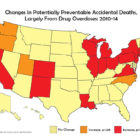I-Team In-Depth
Overdoses Fuel Increase In ‘Preventable’ Accidental Deaths
|
Connecticut saw one of the highest increases in the nation in preventable deaths from unintentional injuries from 2010 to 2014, mainly because of a spike in opioid overdoses, according to a new report from the Centers for Disease Control and Prevention (CDC). An analysis of the report shows that the state’s rate of potentially preventable deaths from accidental injuries jumped 97 percent – the sixth- highest increase nationally, after Maryland, Massachusetts, New Jersey, New York and Virginia. Nationally, preventable deaths from accidents – namely, overdoses from prescription and illicit drugs, as well as falls – rose 23 percent. Connecticut had 1,142 unintentional injury deaths in 2014— the second highest in New England, after Massachusetts. About half (568) were accidental drug intoxication deaths, according to the Office of the Chief Medical Examiner.


